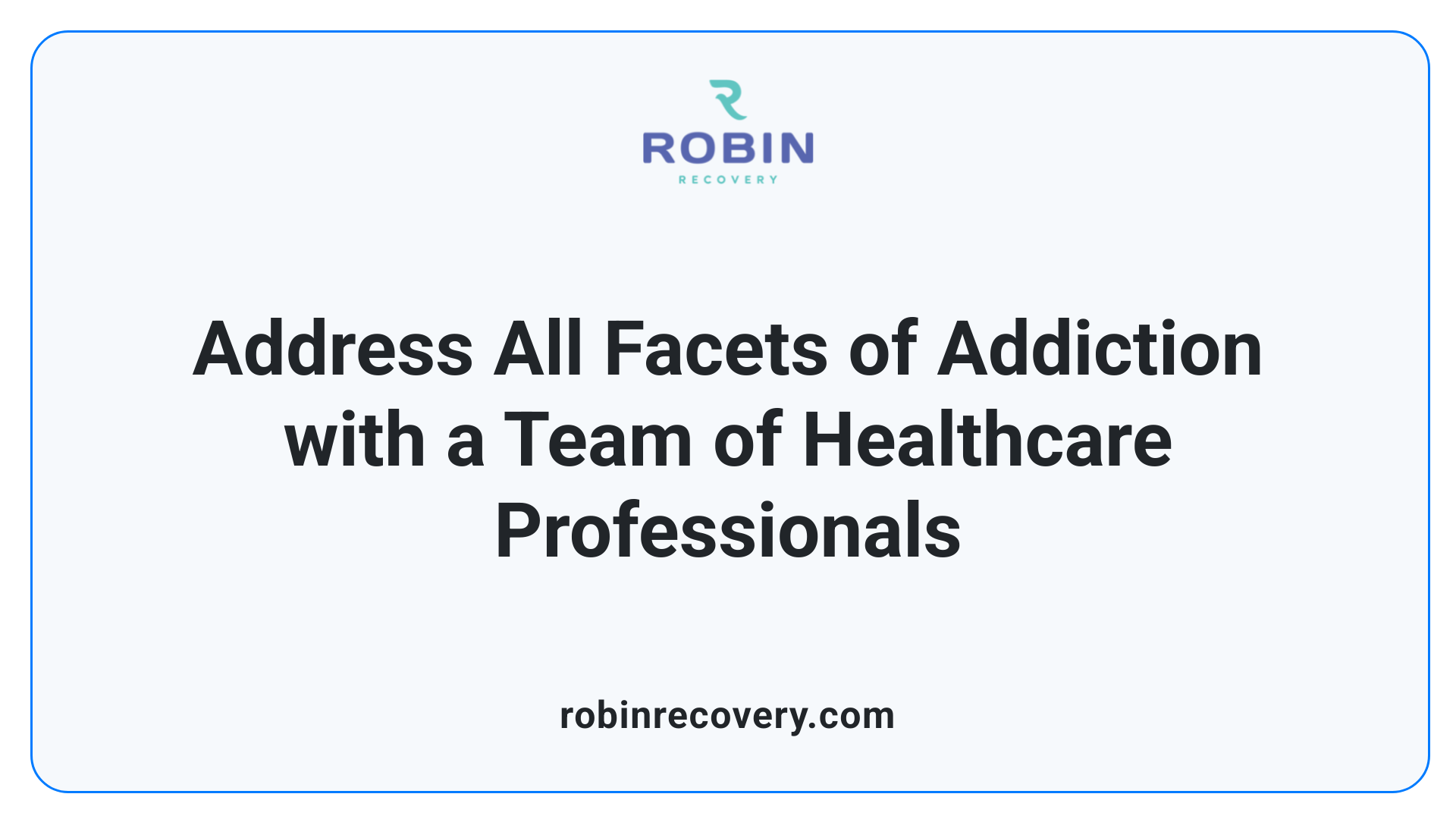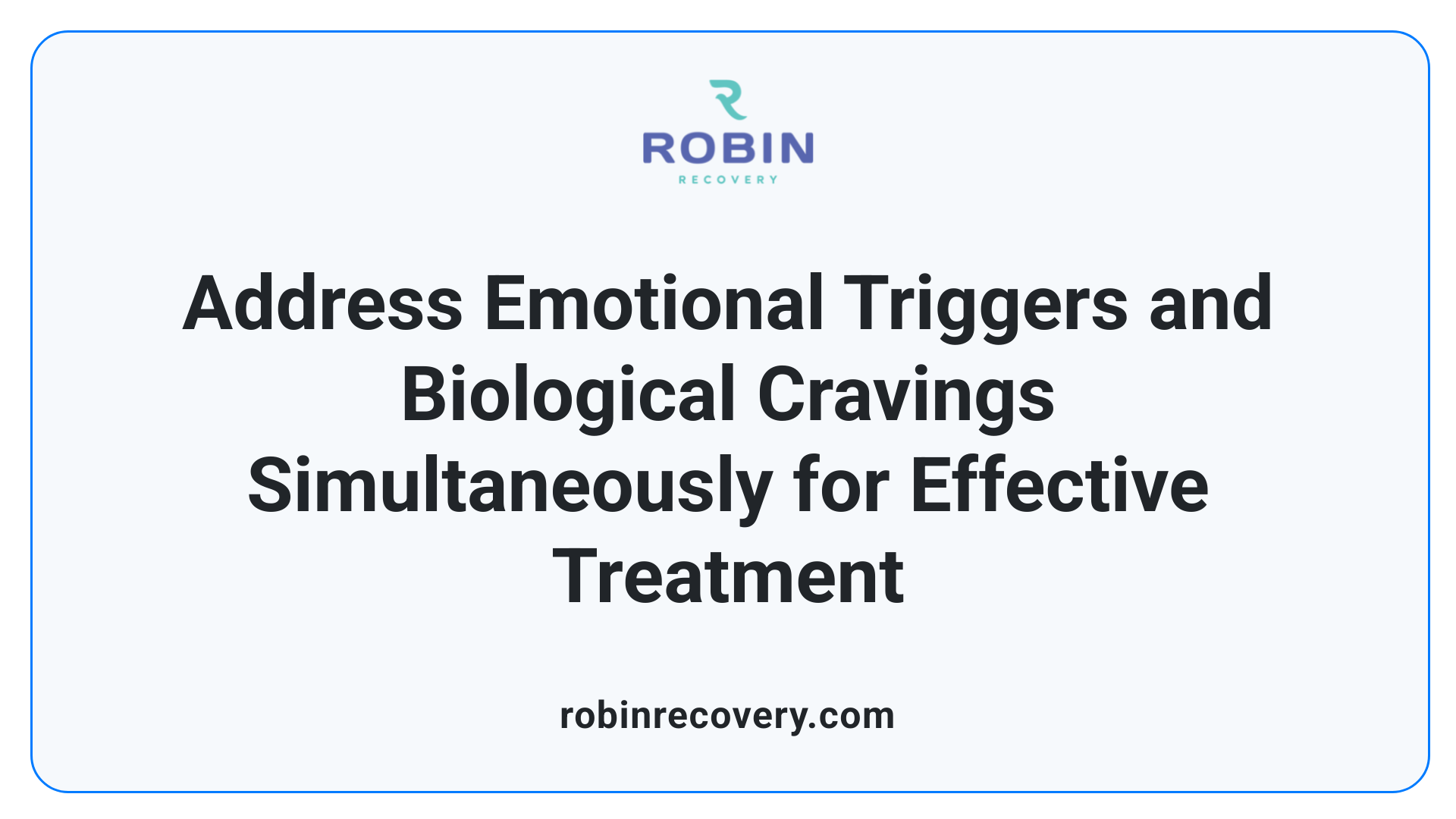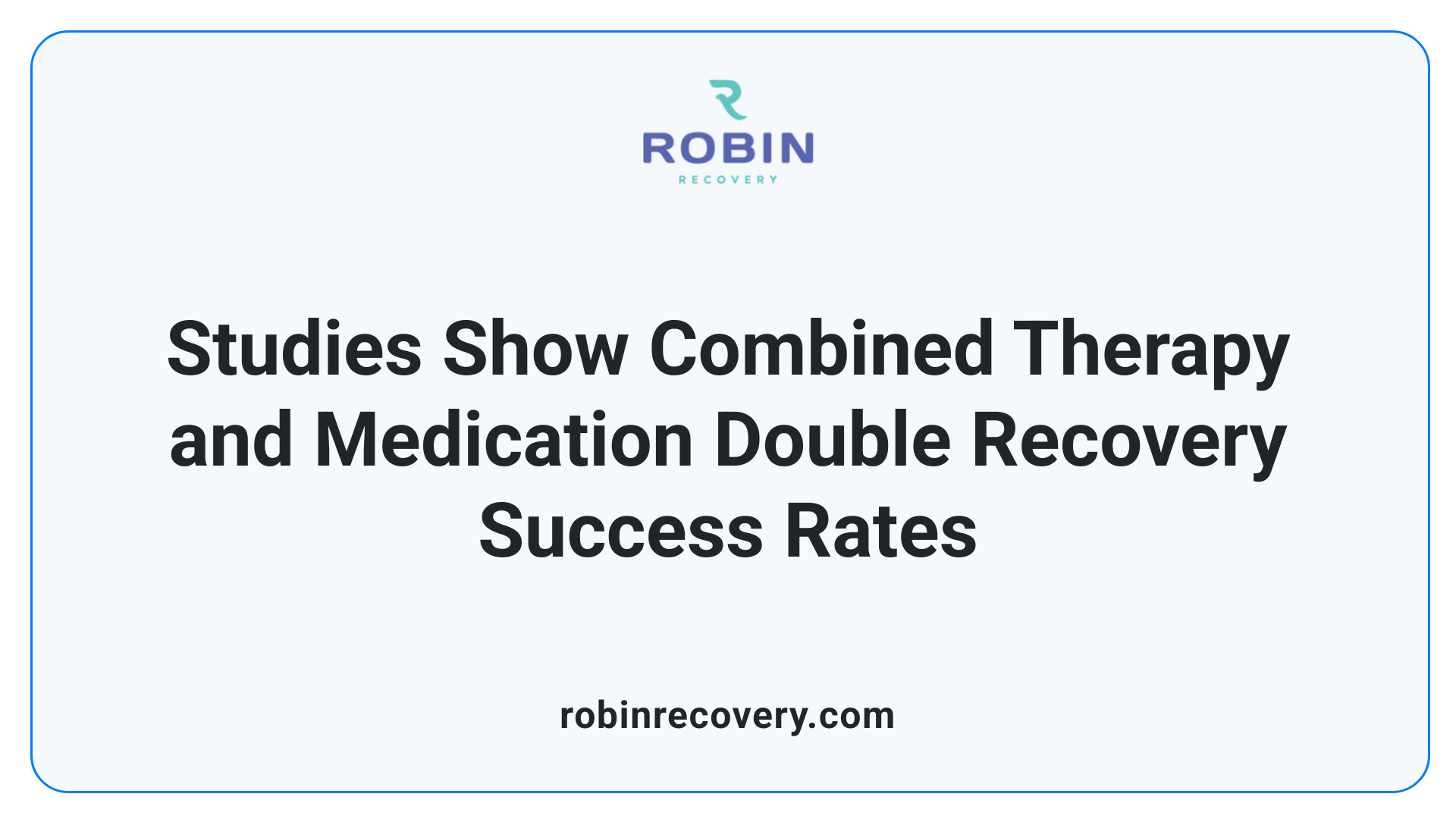The Benefits of Combining Therapy and Medication in Addiction Recovery

Comprehensive Approaches for Effective Recovery
Addiction is a complex, multifaceted disease requiring a holistic approach that addresses biological, psychological, social, and behavioral factors. Combining therapy and medication offers a proven pathway toward sustainable recovery, maximizing treatment efficacy and reducing relapse risk. This article explores how integrated treatment models enhance outcomes, the role of medication-assisted treatment (MAT), evidence supporting combined strategies, best practices for integration, and the profound benefits for individuals battling addiction.
The Necessity of a Multidisciplinary Approach in Addiction Treatment

Why is a multidisciplinary approach important in addiction treatment?
Addiction is a complex disease influenced by biological, psychological, social, and spiritual factors. Therefore, addressing only one aspect often isn’t enough for successful recovery. A multidisciplinary approach combines expertise from various healthcare professionals, such as doctors, therapists, social workers, and spiritual advisors, to create an integrated treatment plan.
This comprehensive strategy targets all facets of a person’s life. For example, medical professionals can manage detoxification and medication, while therapists address underlying emotional issues through modalities like cognitive-behavioral therapy (CBT), trauma therapy, or family therapy.
Support services further provide social reintegration, mental health support, employment assistance, and legal guidance. Addressing co-occurring mental health conditions like depression, anxiety, or trauma is especially crucial, as these can be underlying causes or triggers for substance use.
Personalized treatment plans are vital because each individual’s needs and circumstances vary. Tailoring interventions increases the chances of maintaining sobriety by meeting a person where they are, whether they need medication-assisted treatment (MAT), behavioral therapy, or social support.
In summary, a holistic, team-based approach enhances treatment outcomes. It manages the biological aspects of addiction, supports mental health, fosters social stability, and nurtures emotional and spiritual well-being, ultimately leading to more sustained recovery and lower relapse rates.
Integrating Therapy and Medication: Best Practices and Frameworks
What are the best practices for integrating therapy and medication in treatment plans?
Effective integration of therapy and medication requires a well-structured approach tailored to each individual’s needs. The process begins with a comprehensive assessment to identify mental health issues and any co-occurring disorders, guiding personalized treatment strategies.
Shared decision-making is a vital component. When clients actively participate in choosing their treatment options, they tend to be more engaged, satisfied, and compliant with their plan. Healthcare providers should clearly communicate the benefits and potential side effects of medications while explaining how therapies like CBT, DBT, or trauma therapy can address emotional and psychological triggers.
Regular monitoring through scheduled check-ins allows clinicians to assess the effectiveness of medications and make timely adjustments. This ongoing supervision helps to optimize treatment efficacy and minimize side effects.
Incorporating evidence-based therapies supports the development of coping skills and addresses underlying issues contributing to addiction or mental health disorders. Effective communication between patient and provider about symptoms, progress, and concerns fosters a collaborative environment.
Using an integrated model that combines medication management with targeted psychotherapy provides a holistic approach. This method improves long-term outcomes, enhances treatment retention, and supports sustained recovery. Overall, the key to success lies in coordinated care, personalized plans, and ongoing support tailored to the individual’s evolving needs.
The Complementary Roles of Therapy and Medication in Addiction Recovery

How do therapy and medication complement each other in addiction treatment?
Therapy and medication work hand-in-hand to optimize addiction recovery by targeting different aspects of the disease. Therapy, such as Cognitive Behavioral Therapy (CBT), offers emotional support, helps individuals recognize and manage triggers, and builds essential coping skills. It also works through trauma processing and addressing underlying psychological issues contributing to substance use.
Meanwhile, medication plays a vital biological role by reducing withdrawal symptoms and cravings. Medications like methadone, buprenorphine, or naltrexone help stabilize the brain's chemistry, making it easier for individuals to maintain sobriety and participate actively in therapy.
When combined, these two approaches provide a comprehensive treatment plan. The medication creates a stable physical state that allows therapy to be more effective, while therapy provides the emotional insights and resilience needed for long-term recovery.
Research indicates that this integrated method significantly improves treatment outcomes. It lowers relapse rates, increases retention in treatment programs, and enhances the chances of sustained sobriety.
In summary, combining therapy and medication addresses both the emotional and biological roots of addiction, increasing the likelihood of lasting change. This holistic approach has proven to be more effective than either treatment alone, providing a solid foundation for recovery and helping individuals rebuild their lives.
Research Evidence Supporting Combined Strategies

Numerous studies demonstrate that combining therapy and medication significantly improves outcomes in addiction recovery. Meta-analyses, which review multiple clinical trials, reveal that patients receiving both interventions are 27% more likely to respond positively to treatment compared to those undergoing only psychotherapy, and 25% more likely than those receiving only medication. These findings suggest a clear advantage in integrated treatment approaches.
Lower relapse rates are among the most compelling benefits. When therapy addresses underlying psychological triggers and medication manages physiological cravings, patients experience a more comprehensive form of care. This dual approach effectively decreases the likelihood of returning to substance use, promotes better social functioning, and supports sustained sobriety.
The benefits extend further through the additive effects of different mechanisms. Therapy targets emotional regulation, coping skills, and personal insight, while medications stabilize neurochemical imbalances and reduce physical cravings. This synergy enhances overall treatment efficacy, especially for individuals with complex or chronic conditions.
Research consistently supports these insights. For instance, meta-analyses show that combined therapy and medication deliver faster symptom relief, improve treatment adherence, and lead to more enduring recovery. Personalized plans, tailored through collaboration with healthcare providers, further optimize these benefits.
Evidence Source Effectiveness Measure Results Additional Notes Meta-analyses of clinical trials Response rates, relapse prevention 27% higher recovery likelihood with combined treatment Shows superiority over single treatments Long-term outcome studies Relapse rates, social functioning Reduced relapse, better social adjustment Highlights lasting benefits of integrated approach Mechanism studies Neurochemical balance, psychological resilience Additive effects improve outcomes Combining diverse mechanisms bolsters overall effectiveness
This body of evidence underscores that a holistic, combined approach—using both medication and therapy—results in higher success rates, fewer relapses, and more lasting improvements in recovery.
Understanding Medication-Assisted Treatment (MAT) in Addiction Recovery
What is medication-assisted treatment (MAT) and how does it support addiction recovery?
Medication-assisted treatment (MAT) is a proven approach that combines FDA-approved medications with counseling and behavioral therapies to treat substance use disorders. This comprehensive method addresses both the physical dependence and psychological aspects of addiction.
Medications used in MAT include buprenorphine, methadone, naltrexone, acamprosate, and disulfiram. Each plays a specific role in helping normalize brain chemistry, reduce cravings, and prevent overdoses. For example, methadone and buprenorphine are commonly used to treat opioid dependence, while acamprosate and disulfiram are approved for alcohol addiction.
By reducing intense cravings and managing withdrawal symptoms, MAT helps individuals maintain sobriety and reduces the likelihood of relapse. It also decreases illicit drug use and enhances safety during recovery.
Support from organizations such as SAMHSA emphasizes that MAT is more than just medication. It integrates ongoing counseling and behavioral therapies, which help individuals develop coping skills, improve emotional resilience, and address underlying issues.
Research shows that incorporating medication with therapy improves survival rates, treatment retention, and social integration—including employment and community involvement. The goal of MAT is full recovery, supporting individuals to lead productive, drug-free lives.
Accessible through services like SAMHSA’s National Helpline, MAT ensures confidential help is available to those seeking to overcome addiction. Overall, this approach is essential for effective, long-term recovery and health stability.
Long-Term Benefits and Outcomes of Combined Treatment Approaches
What are the benefits and effectiveness of combining therapy and medication in addiction recovery?
Combining therapy and medication offers a comprehensive approach that significantly improves recovery outcomes. Medications help reduce withdrawal symptoms, diminish cravings, and address neurochemical imbalances, making it easier for individuals to focus on recovery efforts. Therapy, on the other hand, targets behavioral and psychological factors, helping individuals identify triggers, develop coping strategies, and resolve underlying emotional issues.
Studies show that integrated treatment increases the chances of long-term sobriety, lowers relapse rates, and enhances overall well-being. Personalized treatment plans, created in collaboration with healthcare providers, ensure that each person receives tailored support suited to their specific needs.
This combined method is especially effective for severe or complex cases of addiction, providing a safer and more effective path to sustained recovery. The holistic nature of pairing therapy with medication addresses both biological and psychological components of addiction, resulting in more durable and successful outcomes.
Holistic and Evidence-Based Recovery Strategies
Integrating therapy and medication in addiction treatment creates a comprehensive, personalized approach that addresses both the biological and psychological facets of substance use disorders. Supported by extensive research and clinical guidelines, this combined strategy enhances patient survival, reduces relapse, and supports long-term sobriety. Organizations like SAMHSA advocate for this multidisciplinary, evidence-based framework, which incorporates medication-assisted treatment (MAT) and various psychotherapies such as CBT and trauma therapy. When healthcare providers adopt these best practices for integration, individuals seeking recovery benefit from higher treatment retention, improved social functioning, and a genuine chance at sustained, meaningful sobriety. Ultimately, the synergy of therapy and medication not only fosters different pathways to healing but also optimizes outcomes, transforming lives through comprehensive and compassionate care.
References
- National Helpline for Mental Health, Drug, Alcohol Issues | SAMHSA
- Treatment and Recovery | National Institute on Drug Abuse (NIDA)
- Medications for Substance Use Disorders - SAMHSA
- The Importance of Therapy & Medication Management Together
- Combining Drug Therapy and Psychotherapy for Depression
- The Benefits of Therapy and Medication | Jackson House
- Medication and Therapy: Life-Changing Benefits for Mental Health
- Combined drug and psychological therapies may be most effective ...
